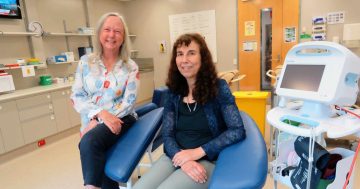 Researchers at the Department of Health are hopeful they may soon be able to take the guesswork out of prescribing drugs for depression by accessing the patient’s DNA.
Researchers at the Department of Health are hopeful they may soon be able to take the guesswork out of prescribing drugs for depression by accessing the patient’s DNA.
Director of the Office of Population Health Genomics, Kristen Nowak (pictured), North Metropolitan Health Service psychiatrist, Sean Hood and Clinical Lead for Primary Care Integration, Jacquie Garton-Smith are part of a new $2.95 million multi-centre investigation, the aim of which is to determine whether first-line medications have a greater chance of succeeding if their prescription is guided by the patient’s individual genetic make-up.
Professor Hood said around half the patients with moderate to severe depression reported no benefit from first-line medications and as many as two thirds failed to achieve long-term remission from their depressive symptoms.
“This is really concerning because it can often take weeks or months to get the right medication and dosage for a severely depressed patient,” Professor Hood said.
The study, which will also run in NSW and Victoria, recruits patients who have been newly diagnosed with moderate to severe depression or who have had a relapse following remission from their condition.
On joining the trial, all participants will undergo a brain scan and provide a buccal swab (cells collected from inside the cheek).
Professor Hood said the cells would be used in a multi-gene test, otherwise known as a pharmacogenomic (PG) test, which would survey around a dozen genes that were known to play a role in metabolism, the biochemical process that affects the way individuals process medications.
Dr Nowak said the test essentially provided a small snapshot of the patient’s DNA code.
“The test will enable a customised report to be generated for every participant in the trial, indicating their likely response to different medications and dosage levels, based on their genetic profile,” Dr Nowak said.
“A personalised treatment plan will also be prepared for each participant, but only half of these plans will be guided by patients’ PG results — the rest will be developed following current standard-of-care guidelines only.”
She said the treatment plans will be reviewed by a national panel of experts with neither the patient nor their treating doctor knowing which group they were assigned to until week 12.
“The study will enable the researchers to assess whether patients given PG-guided care had significant earlier benefit over those receiving standard care,” Dr Nowak said.






